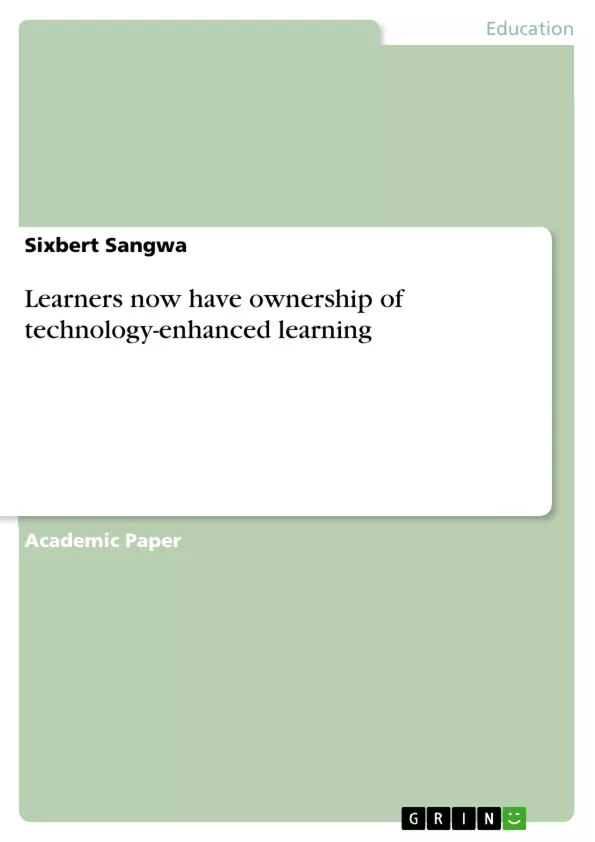This module paper attempts to evaluate how learners own technology enhanced learning. It begins with a critical review of McCarthy’s ‘Learning in the Café: pilot testing the collaborative application for education in Facebook’ and Thorpe’s ‘Effective online interaction: mapping course design to bridge from research to practice’. The fact that Facebook has different features that promote student interactions, it was no surprise that 92 % agreed that Café encourages their interaction with their peers. The importance of this interaction was confirmed by Thorpe (2008) who recommends a range of activities that promote both group and individual participation as well as compulsory student participation for effective interaction.
Inhaltsverzeichnis (Table of Contents)
- McCarthy & Thorpe's Papers
- McCarthy's (2015) paper
- Students interactions
- Engagement in academic discussions
- Recommendations for Facebook design/functionality
- Thorpe's (2008) paper
- The main implications for practitioners
- Application to Technology Enhanced Learning
- McCarthy's (2015) paper
- Learners Now Have Ownership of Technology-Enhanced Learning
- Introduction
- Most powerful arguments and evidence in support of this claim
- Increasing use of web 2.0 technologies
- Increasing use of Suitable Digital devices and softwares
- Most powerful arguments and evidence against the claim
- Strength of the Digital Contents
- Universities' Preference of VLE over Social Networking Sites
- Learner's position in relation to the claim
- Concern for Vulnerable communities
- Principal implications for practitioners in technology-enhanced learning
- Blurring of formal and informal learning
- Change in pedagogy and participants' roles
Zielsetzung und Themenschwerpunkte (Objectives and Key Themes)
This module paper explores the idea of learners owning technology-enhanced learning. It begins by critically reviewing two relevant papers: McCarthy's "Learning in the Café" and Thorpe's "Effective online interaction." The paper investigates the role of Facebook and other web 2.0 technologies in fostering student interactions and engagement in academic discussions. It further explores the implications of these technologies for practitioners in the field of technology-enhanced learning.
- Student interaction in online learning environments
- The role of web 2.0 technologies in education
- The impact of technology on pedagogy and student roles
- The implications of technology-enhanced learning for practitioners
- The challenges and opportunities of learner ownership in technology-enhanced learning
Zusammenfassung der Kapitel (Chapter Summaries)
The paper is divided into three main sections. The first section focuses on two key papers by McCarthy and Thorpe, examining how they contribute to the understanding of student interactions and engagement in online learning. McCarthy's paper explores the use of Facebook as a collaborative learning tool, highlighting the positive impact of the platform on student interactions. Thorpe's paper emphasizes the importance of a variety of activities that promote both individual and group participation in online learning.
The second section delves into the argument that learners now have ownership of technology-enhanced learning. The paper examines strong arguments both for and against this claim. Key aspects discussed include the increasing use of web 2.0 technologies, the potential limitations of digital content, and the preference of universities for traditional virtual learning environments (VLEs). The section also explores the perspective of learners, particularly highlighting the concerns of vulnerable communities regarding access to technology.
The final section, which is not included in this preview, focuses on the implications of learner ownership for practitioners in technology-enhanced learning.
Schlüsselwörter (Keywords)
The paper focuses on key concepts such as web 2.0 technologies in education, online and distance education, social media learning, student ownership of technology-enhanced learning, pedagogy, and participation. It explores the interplay between these concepts in the context of current educational practices.
- Arbeit zitieren
- Dr. Sixbert Sangwa (Autor:in), 2018, Learners now have ownership of technology-enhanced learning, München, GRIN Verlag, https://www.grin.com/document/1012765



